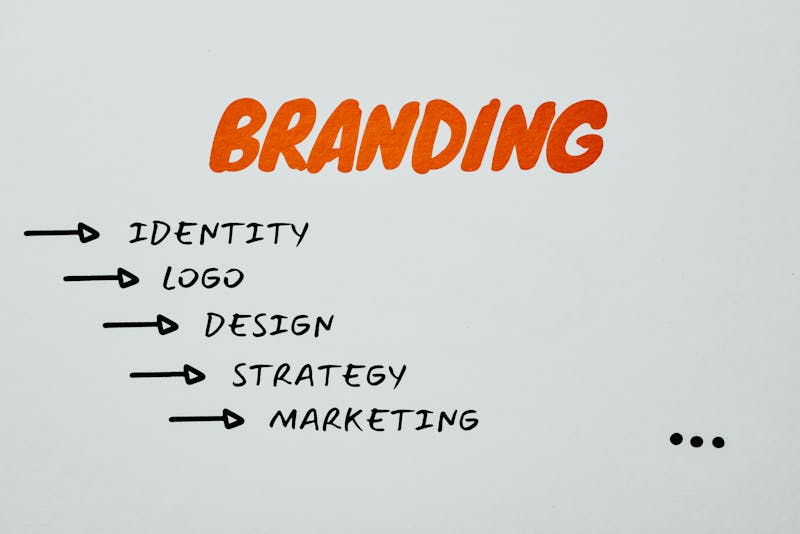- Branding is more than visuals – Logos and colors matter, but branding also includes voice, values, customer experience, and reputation.
- Builds recognition and trust – A strong brand makes your business memorable and credible, fostering customer confidence.
- Drives customer loyalty – Emotional connections through branding encourage repeat business and brand advocacy.
- Creates competitive advantage – Differentiates your business in crowded markets and allows for premium pricing.
- Avoid common pitfalls – Inconsistency, copying competitors, and neglecting customer experience can weaken your brand.
- Practical branding strategies – Define identity, maintain visual and messaging consistency, tell a compelling story, and leverage digital tools.
- Future-focused branding – Embrace authenticity, personalization, sustainability, and digital innovations to stay relevant.
For many business owners, branding is often mistaken for just having a nice logo or choosing the right colours for marketing materials. While visual identity is a crucial element, branding goes far beyond surface-level design. In today’s competitive marketplace, small business branding has become a strategic tool for growth, credibility, and long-term sustainability. It is no longer a luxury reserved for big corporations; it’s a necessity that directly impacts customer loyalty, trust, and recognition.
Whether you are running a café, a trades service, an e-commerce store, or a local consultancy, the way your brand is perceived shapes customer behaviour. A strong brand differentiates you from competitors, builds emotional connections, and fosters repeat business.
This article explores why small business branding matters more than you might realise and provides practical insights to help you strengthen your brand identity.
What Exactly Is Small Business Branding?
Branding is the process of shaping how people perceive your business. For small businesses, this involves creating a unique identity that communicates your values, personality, and promise to customers. It’s about more than just visuals; it’s the story, tone, customer experience, and reputation you cultivate over time.
While large corporations often have dedicated teams managing their brand, small businesses typically need to take a hands-on approach. That’s why it’s crucial to understand that branding isn’t optional—it’s the foundation of how your business is remembered and recommended.
A well-defined small business brand includes:
- Visual Identity – Logo, colour palette, fonts, and design style.
- Brand Voice – The tone and style of your communication, whether formal, casual, or playful.
- Core Values – What your business stands for and how you operate.
- Customer Experience – Every touchpoint, from website navigation to in-store service.
- Reputation – How people talk about you, both online and offline.
When combined, these elements form a consistent brand identity that resonates with your target audience.
Why Is Branding Crucial for Small Businesses?

Many business owners underestimate the power of branding, assuming that only large enterprises need to worry about it. However, branding plays an even more significant role for smaller businesses competing in local or niche markets. Unlike big corporations, you don’t have massive advertising budgets to win customers purely through reach; instead, you must build meaningful recognition and trust.
Here’s why branding is so important for small businesses:
- Recognition – A strong brand ensures customers remember you, not just your product.
- Trust and Credibility – People are more likely to buy from businesses they feel are professional and reliable.
- Customer Loyalty – Branding helps build long-term emotional connections, making repeat purchases more likely.
- Competitive Advantage – A unique brand identity sets you apart from competitors offering similar services.
- Perceived Value – Customers often associate strong branding with higher quality, allowing you to charge competitive prices.
By treating branding as an investment rather than an expense, small businesses can position themselves for sustainable growth.
The Psychology Behind Effective Branding
Branding works on both a rational and emotional level. Humans are naturally drawn to stories, symbols, and experiences that feel familiar and trustworthy. This is why effective branding taps into psychology to create positive associations.
- Colours influence emotions: Blue suggests trust, red evokes passion, and green is linked to growth.
- Logos act as memory triggers, helping customers recall a business quickly.
- Brand Stories connect emotionally, making your business more relatable and authentic.
- Consistency builds familiarity, which in turn fosters trust.
For example, when people think of certain coffee chains, they don’t just think about coffee—they recall the atmosphere, customer service, and cultural associations tied to the brand. Small businesses can achieve the same effect by carefully crafting their identity and ensuring it’s consistent across all touchpoints.
How Branding Builds Trust and Credibility
Trust is the backbone of customer relationships. For small businesses, where word-of-mouth referrals and repeat customers are vital, credibility can make or break success.
A consistent and professional brand signals reliability. Customers are more likely to choose a business that appears polished and organised over one that seems inconsistent or unclear. Strong branding also demonstrates that you value your business, which reassures customers that you will value them as well.
Consider these ways branding builds credibility:
- Professionalism – A cohesive brand identity shows you take your business seriously.
- Reputation Management – Clear branding makes it easier for customers to leave reviews and recognise your business online.
- Authority – Sharing consistent brand messaging across channels establishes your expertise.
- Customer Assurance – Trust is reinforced when promises made by the brand align with customer experiences.
The result is that business customers not only choose once but also continue to return to and recommend.
Branding and Customer Loyalty: Why People Keep Coming Back
Loyalty doesn’t happen by accident—it’s carefully nurtured. Branding plays a critical role in creating emotional connections that keep customers engaged. When people feel aligned with your values, mission, or personality, they become more than just customers; they become advocates.
Think about your own habits. You might return to the same local bakery not just for the pastries, but because of the warm, welcoming atmosphere and the sense of community it fosters. That’s branding at work.
Brand-driven loyalty has tangible benefits:
- Higher Retention Rates – Loyal customers cost less to maintain than acquiring new ones.
- Word-of-Mouth Marketing – Satisfied customers share their experiences, expanding your reach organically.
- Brand Advocacy – Customers defend and recommend your business, even against competitors.
- Long-Term Profitability – Repeat customers often spend more over time.
For small businesses with limited marketing budgets, building loyalty through branding is one of the most cost-effective growth strategies.
How Small Business Branding Creates Competitive Advantage
In saturated markets, it’s often difficult for small businesses to compete on price alone. Branding provides a way to stand out without compromising profitability. By creating a strong identity, you differentiate your business beyond the products or services you sell.
For example, two local plumbing companies may offer similar pricing and services. However, if one has a strong brand identity—clear logo, professional website, consistent communication, and positive reputation—it will almost always win more customers. That perception of reliability and professionalism is priceless.
Branding also allows small businesses to:
- Communicate Unique Value Propositions – Highlighting what makes you different.
- Position for Premium Pricing – Customers pay more for businesses they perceive as higher quality.
- Expand Market Reach – A recognisable brand attracts new customers faster.
- Future-Proof the Business – Strong branding provides stability, even during market fluctuations.
Your brand is the story customers tell about you when you’re not in the room. Crafting that story intentionally ensures you stand out in ways that matter.
Common Branding Mistakes Small Businesses Should Avoid
While branding offers huge benefits, many small businesses fall into traps that weaken their efforts. Some common mistakes include:
- Inconsistency – Using different logos, colours, or messaging across platforms confuses customers.
- Copying Competitors – Mimicking other businesses makes you forgettable rather than unique.
- Neglecting Customer Experience – Branding isn’t just marketing; it includes how people feel when interacting with your business.
- Failing to Adapt – Outdated branding can make a business appear irrelevant.
- Ignoring Online Presence – In today’s digital-first world, an unbranded or poorly designed website hurts credibility.
By recognising and avoiding these pitfalls, business owners can ensure their branding strategies deliver maximum impact.
Practical Strategies to Strengthen Small Business Branding

Now that we’ve explored why branding matters, let’s discuss practical steps small business owners can take to build or refine their brand.
1. Define Your Brand Identity
Clarify your mission, vision, values, and unique selling proposition. These will form the foundation of your brand voice and visuals.
2. Create a Consistent Visual Identity
Invest in a professional logo and style guide that defines colour palettes, fonts, and design standards.
3. Craft a Compelling Brand Story
Communicate not only what you do, but why you do it. Customers connect with purpose-driven businesses.
4. Ensure Consistency Across Platforms
From your website and social media to in-store experiences, your branding should feel seamless.
5. Focus on Customer Experience
Every interaction should reflect your brand values—whether online or face-to-face.
6. Leverage Digital Tools
Use social media, email marketing, and SEO to extend brand awareness.
7. Monitor and Adapt
Regularly gather feedback and analyse performance to refine your branding strategy.
By consistently implementing these steps, small businesses can create a strong and lasting brand identity.
The Future of Small Business Branding
Branding is not static; it evolves with consumer expectations, technology, and cultural shifts. For small businesses to stay competitive, they must adapt their branding strategies to future trends.
Key developments shaping the future include:
- Authenticity and Transparency – Consumers increasingly value honest and ethical businesses.
- Personalisation – Tailored customer experiences strengthen brand loyalty.
- Digital Branding – Online presence continues to be a non-negotiable aspect of credibility.
- Sustainability – Eco-conscious branding resonates strongly with modern consumers.
- AI and Technology – Automation tools are helping small businesses manage branding more efficiently.
Small businesses that embrace these shifts will be better equipped to build strong connections with customers in the years ahead.
Conclusion: Why Small Business Branding Matters More Than You Think
Branding is not just about logos or catchy slogans—it’s about shaping how your business is perceived and remembered. For small businesses, strong branding creates trust, loyalty, and competitive advantage, all of which are essential for growth.
In an increasingly crowded marketplace, customers want more than just products or services; they want to connect with brands that feel authentic, consistent, and trustworthy. By investing in branding, small business owners can ensure they not only attract customers but also retain them for the long haul.
When done right, branding transforms small businesses into recognisable, respected, and resilient enterprises. And that is why small business branding matters more than you think.

